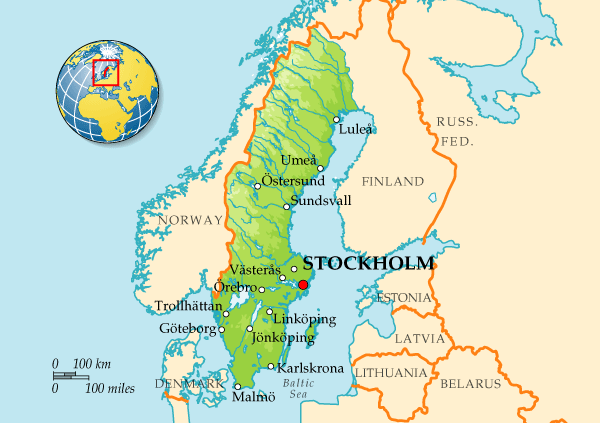Population : 8 876 744 habitants (est. 2002)
Pays voisins : Norvège, Finlande
Densité : 19.73 hab./km²
Superficie : 449 964 km²
Capitale : Stockholm
Principales villes : Göteborg, Malmö, Uppsala, Orebro, Norrköping, Västerås, Linköping, Jönköping, Helsingborg, Borås, Sundsvall, Umeå, Gävle, Skellefteå
Point culminant : Kebnekaise 2 117 m.
Langue(s) parlée(s) : Suédois
Langue(s) officielle(s) : Suédois
Monnaie : Couronne
Fête nationale : 6 juin

Imperative to follow our blog to validate your registration.
Thank you for your understanding
Pays voisins : Norvège, Finlande
Densité : 19.73 hab./km²
Superficie : 449 964 km²
Capitale : Stockholm
Principales villes : Göteborg, Malmö, Uppsala, Orebro, Norrköping, Västerås, Linköping, Jönköping, Helsingborg, Borås, Sundsvall, Umeå, Gävle, Skellefteå
Point culminant : Kebnekaise 2 117 m.
Langue(s) parlée(s) : Suédois
Langue(s) officielle(s) : Suédois
Monnaie : Couronne
Fête nationale : 6 juin

Imperative to follow our blog to validate your registration.
Thank you for your understanding
At , Sweden is the third largest country in the European Union by area, with a total population of about 9.5 million. Sweden has a low population density of with the population mostly concentrated to the southern half of the country. About 85% of the population live in urban areas. Sweden's capital city is Stockholm, which is also the largest city. Since the early 19th century Sweden has been at peace and has avoided war.
Today, Sweden is a constitutional monarchy with a parliamentary democracy form of government and a highly developed economy. Sweden has the world's eighth highest per capita income. In 2011, it ranked fourth in the world in The Economist's Democracy Index and tenth in the United Nations' Human Development Index (third on the inequality-adjusted HDI). In 2010, the World Economic Forum ranked Sweden as the second most competitive country in the world, after Switzerland. According to the UN, it has the third lowest infant mortality rate in the world. In 2010, Sweden also had one of the lowest Gini coefficients of all developed countries (0.25), making Sweden one of the world's most equal countries in terms of income. Sweden's wealth, however, is distributed much less equally than its income, with a wealth Gini coefficient of 0.85, which is higher than the European average of 0.8.






